26-01
Jesus in Galilee [26-01]
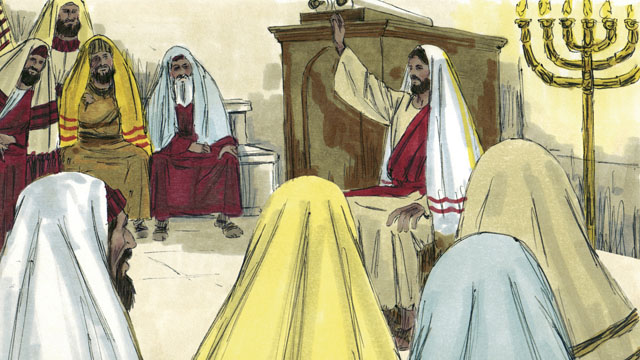
After overcoming Satan's temptations, Jesus returned in the power of the Holy Spirit to the region of Galilee where he lived. Jesus went from place to place teaching. Everyone spoke well of him.
胜过撒旦试探之后,耶稣满有圣灵的能力,回到他住的地方加利利,开始各处讲道,众人都称赞他。
Important Terms:
Translation Notes:
- After overcoming Satan's temptations, Jesus returned - You may prefer to make this into two sentences and say, "Jesus did not do the wrong things Satan tried to get him to do and so defeated him. After that, Jesus returned." The word "overcoming" can also be translated with "resisting" or, "rejecting" or, "refusing."
- in the power of the Holy Spirit - This may be translated as, "as the power of the Holy Spirit worked through him" or, "and the Holy Spirit was powerfully guiding him."
- went from place to place teaching - That is, he "traveled to different towns and other places and taught the people there."
- Everyone - That is, "Everyone who knew him or heard about him."
- spoke well of him - That is, "said good things about him."
26-02
Jesus in Nazareth [26-02]
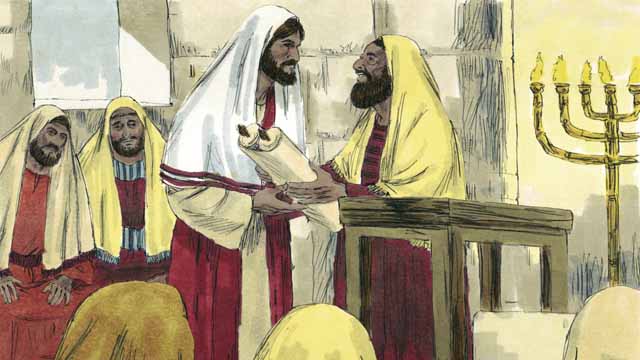
Jesus went to the town of Nazareth where he had lived during his childhood. On the Sabbath, he went to the place of worship. They handed him the scroll of the prophet Isaiah so that he would read from it. Jesus opened up the scroll and read part of it to the people.
耶稣来到拿撒勒,就是他长大的地方。在安息日,他来岛敬拜的会堂。有人把先知以赛亚的书交给他,耶稣就打开,开始读。
Important Terms:
Translation Notes:
- place of worship - That is, "the building where the Jews gathered to worship God." This can also be translated as, "worship building."
- scroll - A scroll was a long sheet of paper or leather that was rolled up and had writing on it.
- the scroll of the prophet Isaiah - That is, "the scroll that had the words that the prophet Isaiah had written." Isaiah had written on a scroll hundreds of years before. This was a copy of that scroll.
- opened up the scroll - This could be translated as, "rolled open the scroll" or, "unrolled the scroll."
26-03
Jesus Read the Scriptures [26-03]
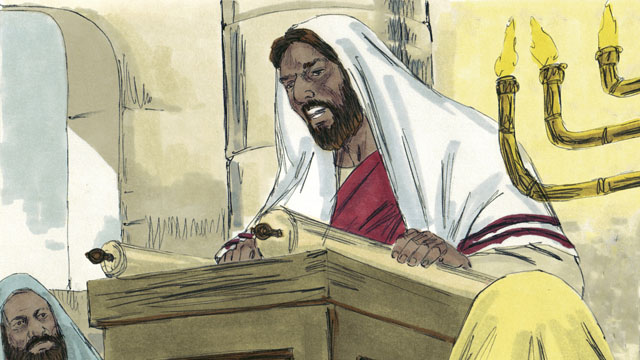
Jesus read, “God has given me his Spirit so that I can proclaim good news to the poor, freedom to captives, recovery of sight for the blind, and release to the oppressed. This is the year of the Lord's favor.”
“主的灵已经浇灌在我身上,叫我传福音给贫穷的人,被掳的得自由,瞎眼的得看见,狱中的得释放。这是神悦纳人的禧年。”
Important Terms:
Translation Notes:
- proclaim good news to the poor - That is, "to tell poor and needy people the good message that God will help them."
- freedom to captives - That is, "to tell people who are wrongfully in prison that they will be released."
- recovery of sight for the blind - This could be translated as, "that those who are blind will receive their sight."
- release to the oppressed - That is, "freedom for those who are mistreated in life."
- the year of the Lord's favor - This may be translated as, "the time when the Lord will be merciful to us" or, "the time when the Lord will be very gracious to us."
26-04
The Prophesy about Jesus [26-04]
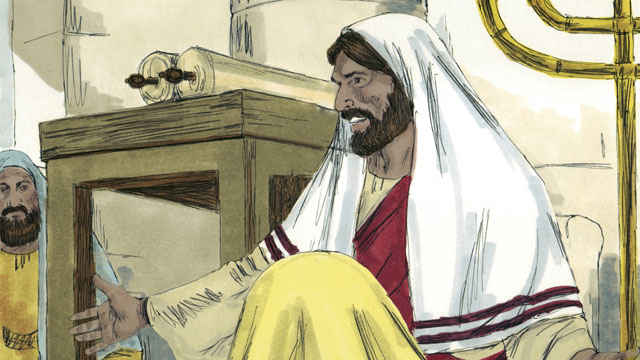
Then Jesus sat down. Everybody watched him closely. They knew the passage of scripture that he had just read referred to the Messiah. Jesus said, “The words I just read to you are happening right now.” All the people were amazed. “Isn’t this the son of Joseph?” they said.
讲完耶稣就坐下,会堂里的人都定眼看他。他们知道所讲的和弥赛亚有关。耶稣说:“今天这经应验在你们耳中了。”众人都称赞他,问:“这不是约瑟的儿子吗?”
Important Terms:
Translation Notes:
- The words I just read to you are happening right now - Other ways to translate this would be, "The words you just heard me read are being fulfilled right now" or, "Today the words I read to you came true as you heard them."
- amazed - Translate the word "amazed" with a term that means that they were surprised, shocked, and confused about how this could be possible.
- Isn't this the son of Joseph? –This could also be translated as, "This man is only the son of Joseph!" or, "Everyone knows he is just Joseph's son!" The people were not asking if he was Joseph's son or not. They were wondering how he could be the Messiah since they thought he was only the son of an ordinary man.
26-05
The Ministry of Elijah [26-05]
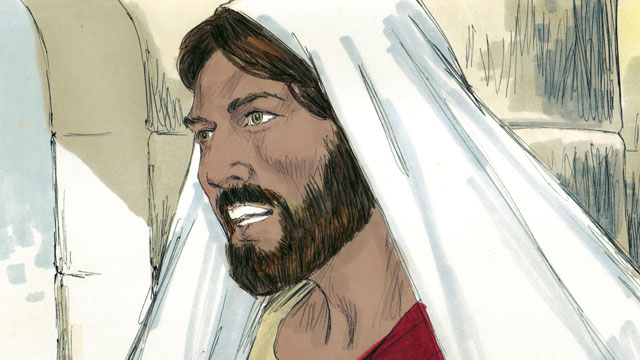
Then Jesus said, “It is true that no prophet is accepted in his own hometown. During the time of the prophet Elijah, there were many widows in Israel. But when it did not rain for three and a half years, God did not send Elijah to help a widow from Israel, but rather to a widow from a different nation.”
耶稣说:“我实在告诉你们,没有先知在自己家乡被悦纳。当以利亚的时候,以色列中有许多寡妇。三年半没有下雨,神没有差遣以利亚去帮助一个以色列寡妇,却帮助了一个外邦的寡妇。
Important Terms:
Translation Notes:
- no prophet is accepted in his hometown - This phrase means, "people do not recognize the authority of a prophet that has grown up among them."
26-06
The Ministry of Elisha [26-06]
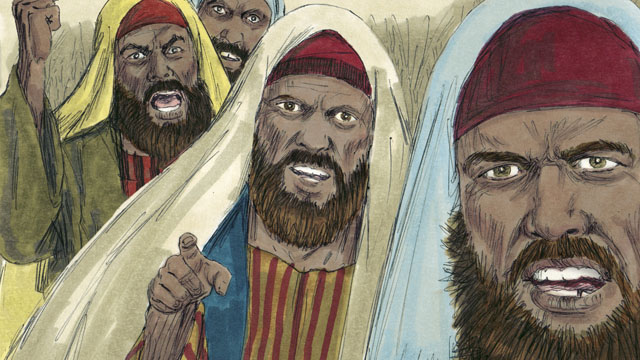
Jesus continued saying, “And during the time of the prophet Elisha, there were many people in Israel with skin diseases. But Elisha did not heal any of them. He only healed the skin disease of Naaman, a commander of Israel’s enemies.” The people who were listening to Jesus were Jews. So when they heard him say this, they were furious at him.
先知以利亚的时候,以色列人中有许多人有皮肤病。除了一个以色列敌人的首领乃缦被医治外,以利亚没有医治其他人。以色列人听说这个后非常生气。
Important Terms:
Translation Notes:
- Elisha - Elisha was God's prophet who came after Elijah. Like Elijah, Elisha confronted Israelite kings who were sinning against God and he did miracles that God gave him power to do.
- a commander - That is, "a military leader."
- they were furious at him - The Jews did not want to hear that God had blessed any people group besides themselves, so they were very angry at what Jesus said.
26-07
The Attempt to Kill Jesus [26-07]
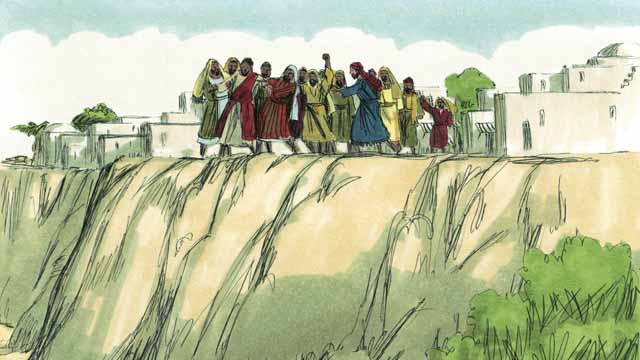
The people of Nazareth dragged Jesus out of the place of worship and brought him to the edge of a cliff to throw him off of it in order to kill him. But Jesus walked through the crowd and left the town of Nazareth.
他们就把耶稣拖出会堂带到山崖,要把他推下去。耶稣却从他们中间走过去了,离开了拿撒勒城。
Important Terms:
Translation Notes:
- place of worship - That is, "the building where the Jewish people gathered to worship God." This can also be translated as "worship building." See how you translated it in [[:zh:obs:notes:frames:26-02|[26-02]]].
- But Jesus walked through the crowd - "But" could be translated with a strong contrast word or phrase such as "But instead" or, "However" to show that the people were not able to do to Jesus what they had planned to do.
26-08
Jesus Healed the Sick [26-08]
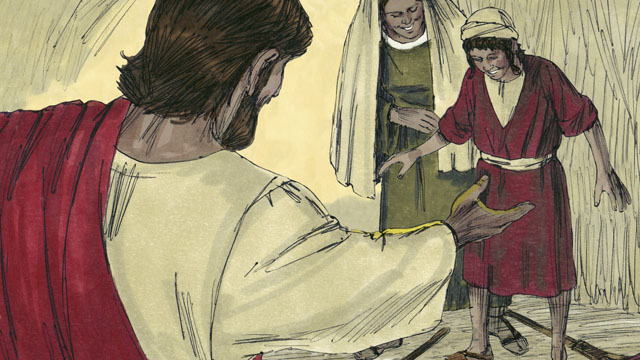
Then Jesus went throughout the region of Galilee, and large crowds came to him. They brought many people who were sick or handicapped, including those who could not see, walk, hear, or speak, and Jesus healed them.
耶稣经过那地时,众人纷纷过来看到。他们带来了所以生病的人,有瞎子、瘸子、聋子、哑巴,耶稣都医治了他们。
Important Terms:
Translation Notes:
- went throughout the region of Galilee - That is, "all around in Galilee" or, "from place to place in Galilee."
26-09
Jesus Removed the Demons [26-09]
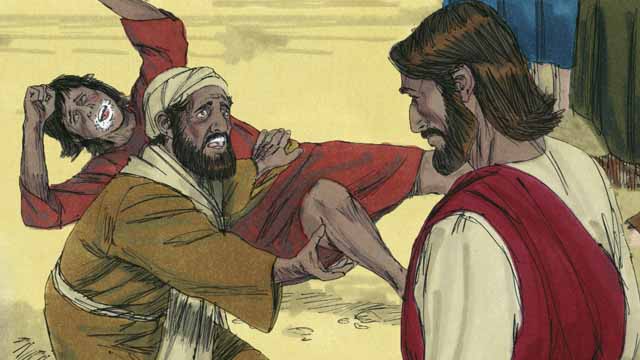
Many people who had demons in them were brought to Jesus. At Jesus' command, the demons came out of the people, and often shouted, “You are the Son of God!” The crowds of people were amazed and worshiped God.
很多被鬼附身的人也被带到耶稣面前。污鬼出来后大声说:”你是神的儿子!“。众人就惊奇开始敬拜神。
Important Terms:
Translation Notes:
- who had demons in them –That is, "who were controlled by evil spirits."
- When Jesus commanded them - This could also be translated as, "When Jesus gave the command to them."
26-10
The Twelve Disciples [26-10]
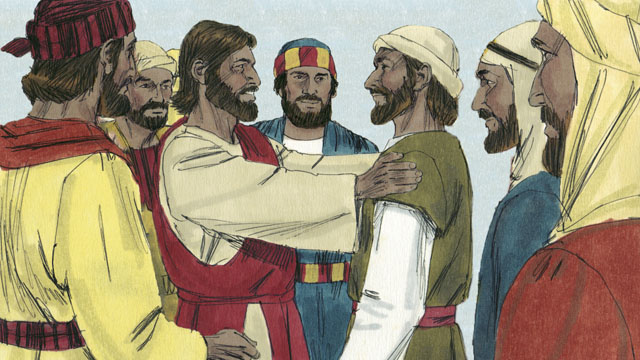
Then Jesus chose twelve men who were called his apostles. The apostles traveled with Jesus and learned from him.
耶稣就选中了十二个人做他的门徒。这些门徒就是耶稣的学生。他们跟着耶稣各处学习讲道。
Important Terms:
Translation Notes:
- learned from him - That is, "learned from what he taught them" or, "learned from everything he said and did."
- A Bible story from - These references may be slightly different in some Bible translations.
